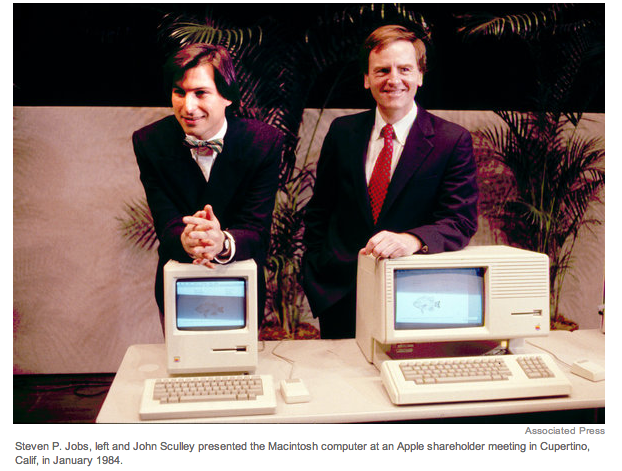Hello World.
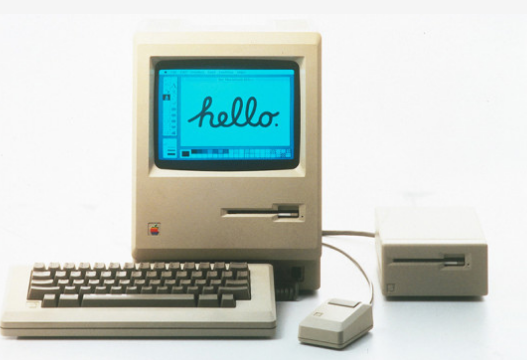 Historians are all about periodization. Part of our job entails breaking down the rivers of history into bite-sized chunks for the sake of crafting a narrative, teaching a comprehensible class (c.f. "Western Civilization, 1000-1500" etc.), or framing a doable research project. It's one of the ways we make sense of time yet we recognize its artificiality. A cousin of periodization is commemoration - noting the nth anniversary of something, revisiting it, and rethinking it. A big one this year is the 100th anniversary of the start of World War One. But this past week, we saw another commemoration - a flurry of retrospectives and stories about the 30th anniversary of the original Macintosh PC.
Historians are all about periodization. Part of our job entails breaking down the rivers of history into bite-sized chunks for the sake of crafting a narrative, teaching a comprehensible class (c.f. "Western Civilization, 1000-1500" etc.), or framing a doable research project. It's one of the ways we make sense of time yet we recognize its artificiality. A cousin of periodization is commemoration - noting the nth anniversary of something, revisiting it, and rethinking it. A big one this year is the 100th anniversary of the start of World War One. But this past week, we saw another commemoration - a flurry of retrospectives and stories about the 30th anniversary of the original Macintosh PC.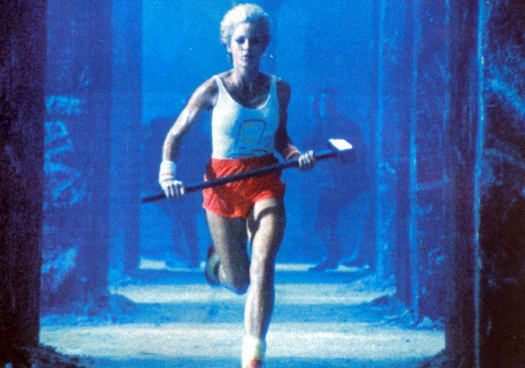 Millions of Americans met the Macintosh on 22 January 1984 during the third quarter of Superbowl XVIII (which featured the Los Angeles Raiders (huh??) playing the Washington Redskins) via Apple's famous "1984" commercial. Set in some dystopian tech-future, liberation came in the form of athletic blonde hurling a giant hammer to smash a grey, imposing "Big Brother" (i.e. IBM) visage. The commercial was directed by Ridley Scott; two years, his (first) version of Blade Runner came out so he was already well-versed in dystopian imagery. The allusions to Orwell's 1984 continued - the commercial concluded with the line "...you'll see why 1984 won't be like “1984.” A few days later, the first Macintoshs appeared in stores.
Millions of Americans met the Macintosh on 22 January 1984 during the third quarter of Superbowl XVIII (which featured the Los Angeles Raiders (huh??) playing the Washington Redskins) via Apple's famous "1984" commercial. Set in some dystopian tech-future, liberation came in the form of athletic blonde hurling a giant hammer to smash a grey, imposing "Big Brother" (i.e. IBM) visage. The commercial was directed by Ridley Scott; two years, his (first) version of Blade Runner came out so he was already well-versed in dystopian imagery. The allusions to Orwell's 1984 continued - the commercial concluded with the line "...you'll see why 1984 won't be like “1984.” A few days later, the first Macintoshs appeared in stores.
At the computer's launch - preserved in this video - a confident Steve Jobs lifted the machine out of its carrying bag and put the new computer through its paces. This included a demonstration of Mac's speech capabilities, made all the more memorable when it took a swipe at IBM's mainframes and cautioned that one should "never trust a computer you can't lift." The response? Ecstatic, prolonged applause.
My point in recounting this is not to add to the Apple homage-fest. There are plenty of tech writers who filed excellent retrospective pieces (here and here and here, for example). Instead, what caught my interest was at a slightly more meta-level. I was intrigued by how original Apple advertisement - now hailed as a classic - played with the larger social fears and anxieties that accompanied the start of the 1984 calendar year. It got me thinking about other predictions for the technological future from 1984 and the overall nature of commemorating this or that technology.
Thirty years ago, George Orwell, certainly, and his dystopian imaginings received a great deal of attention. A quick search of the New York Times data base shows more than 150 articles coming out around late 1983/early1984 that, in one way or another, juxtapose Orwell's futuristic novel - published in 1949 - with predictions of various futures to come.
In Washington, DC they even held a big academic conference to discuss the Orwellian implications of future technologies. Ominously titled "The Road of 1984: High Technology and Human Freedom", the four-day symposium brought together slew of experts at the Smithsonian to discuss "various aspects of society in light of...Orwell's novel 1984." At the meeting a pollster revealed the results of a phone survey - it found that almost half of Americans were "very concerned" about threats to their personal privacy. 80% of respondents believed that "it would be easy for someone to assemble a master file on their lives that would violate their privacy." Look at this headline...prescient, no? As they say, ripped from today's headlines. Except it was 30 years ago.
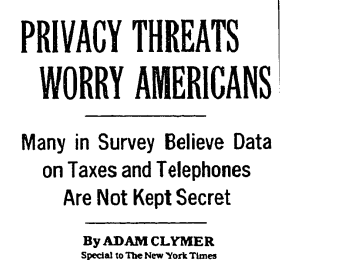 Apple's "1984" commercial hacked into this broader cultural dialogue, reframed it, and broadcast it back to millions of football fans. Apple's advertisement worked so well precisely because it contrasted a shiny, colorful, and playful utopian future with such a grey, grim, and humorless alternative.1984 saw many other notable "technology events". For instance: At the first Hackers Conference, Stewart Brand remarked (to Apple co-founder and newly minted millionaire Steve Wozniak, no less) that "Information wants to be free." Now often cited as a founding principle for cyber-libertarians, most people have forgotten the other half of Brand's statement which was "information wants to be expensive, because it's so valuable." Juxtapose Brand's statement with the fears of average Americans about what might happen to their privacy if information did in fact become "free" and start circulating more widely. Now jump ahead 30 years and into the quagmire of Anonymous, Edward Snowden, the NSA...how should we think of Brand's off-hand comment now? "Expensive" takes on a set of meanings far beyond financial ones.1984 also saw the emergence of the "tech intellectual". The very first Technology, Entertainment, and Design (i.e. TED) conference was held that year. Attendees included MIT's Nicolas Negroponte (the Media Lab was just about to open its over-hyped doors) and - no surprise - Stewart Brand, the Zelig of just about every tech scene in the late 20th century. But it was, perhaps, a dubious achievement. The first TED lost money and it took six more years before, with the riches of cyberspace beckoning, the organizers tried the format again. Of course, TED has now become something to parody, perhaps even to lament.Finally - for a really dystopian view of the future, made all the more real via 1984-era computer graphics, theaters in October premiered The Terminator. Set in Los Angeles of 1984/2029, the film featured just about every technology-induced nightmare one could imagine - artificial intelligence run amok; killer robots; nuclear apocalypse; and, of course, California's future governor on a cinematic murder spree.
Apple's "1984" commercial hacked into this broader cultural dialogue, reframed it, and broadcast it back to millions of football fans. Apple's advertisement worked so well precisely because it contrasted a shiny, colorful, and playful utopian future with such a grey, grim, and humorless alternative.1984 saw many other notable "technology events". For instance: At the first Hackers Conference, Stewart Brand remarked (to Apple co-founder and newly minted millionaire Steve Wozniak, no less) that "Information wants to be free." Now often cited as a founding principle for cyber-libertarians, most people have forgotten the other half of Brand's statement which was "information wants to be expensive, because it's so valuable." Juxtapose Brand's statement with the fears of average Americans about what might happen to their privacy if information did in fact become "free" and start circulating more widely. Now jump ahead 30 years and into the quagmire of Anonymous, Edward Snowden, the NSA...how should we think of Brand's off-hand comment now? "Expensive" takes on a set of meanings far beyond financial ones.1984 also saw the emergence of the "tech intellectual". The very first Technology, Entertainment, and Design (i.e. TED) conference was held that year. Attendees included MIT's Nicolas Negroponte (the Media Lab was just about to open its over-hyped doors) and - no surprise - Stewart Brand, the Zelig of just about every tech scene in the late 20th century. But it was, perhaps, a dubious achievement. The first TED lost money and it took six more years before, with the riches of cyberspace beckoning, the organizers tried the format again. Of course, TED has now become something to parody, perhaps even to lament.Finally - for a really dystopian view of the future, made all the more real via 1984-era computer graphics, theaters in October premiered The Terminator. Set in Los Angeles of 1984/2029, the film featured just about every technology-induced nightmare one could imagine - artificial intelligence run amok; killer robots; nuclear apocalypse; and, of course, California's future governor on a cinematic murder spree.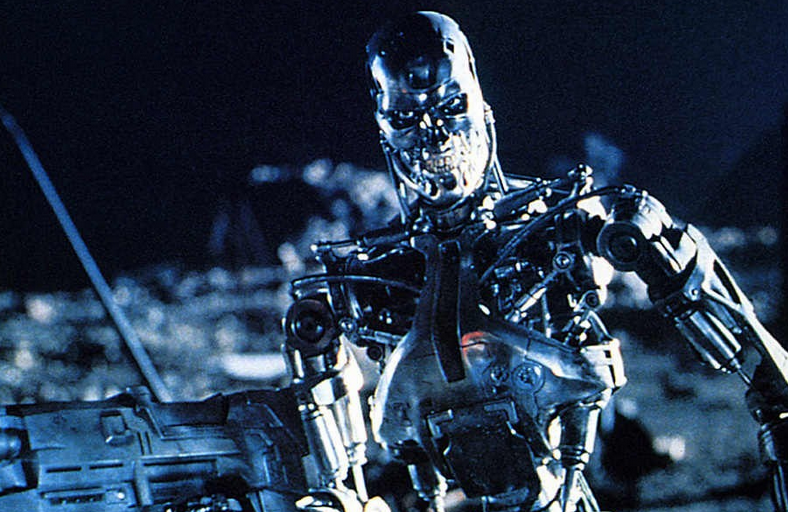 Ultimately, there's nothing inherently special about these (or any other) "technological commemorations." 1984 - like all years - saw a whole host of technological debuts. We remember the introduction of the Macintosh largely because Apple has navigated treacherous corporate waters to become one of the highest valued and successful tech companies. If the Macintosh had failed and taken Apple down with it, I doubt we would have such a plethora of laudatory looks back. To be sure, a decade later, it was far from a foregone conclusion that we would be celebrating, much less remembering, the Macintosh today. ((When the ten-year anniversary of the Macintosh happened, Apple was on the ropes. I was hard pressed to find any commemorations for the Macintosh in 1994...other than the ominous "Apple's Earnings Plunge as Revenues Rise."))Historians recognize the flaws inherent in any sort of periodization. The 30th anniversary of the Macintosh is certainly something to think about. But not only for what happened during a Superbowl commercial or on a stage in Cupertino. Commemorations matter for what they tells us about ourselves today, how we fantasize about or fear our technology now. So - what new technologies will say "Hello World" this year? How will we remember them in thirty years? Will we still care? Will they have made the world a better place? Will they have hurt us?
Ultimately, there's nothing inherently special about these (or any other) "technological commemorations." 1984 - like all years - saw a whole host of technological debuts. We remember the introduction of the Macintosh largely because Apple has navigated treacherous corporate waters to become one of the highest valued and successful tech companies. If the Macintosh had failed and taken Apple down with it, I doubt we would have such a plethora of laudatory looks back. To be sure, a decade later, it was far from a foregone conclusion that we would be celebrating, much less remembering, the Macintosh today. ((When the ten-year anniversary of the Macintosh happened, Apple was on the ropes. I was hard pressed to find any commemorations for the Macintosh in 1994...other than the ominous "Apple's Earnings Plunge as Revenues Rise."))Historians recognize the flaws inherent in any sort of periodization. The 30th anniversary of the Macintosh is certainly something to think about. But not only for what happened during a Superbowl commercial or on a stage in Cupertino. Commemorations matter for what they tells us about ourselves today, how we fantasize about or fear our technology now. So - what new technologies will say "Hello World" this year? How will we remember them in thirty years? Will we still care? Will they have made the world a better place? Will they have hurt us?
